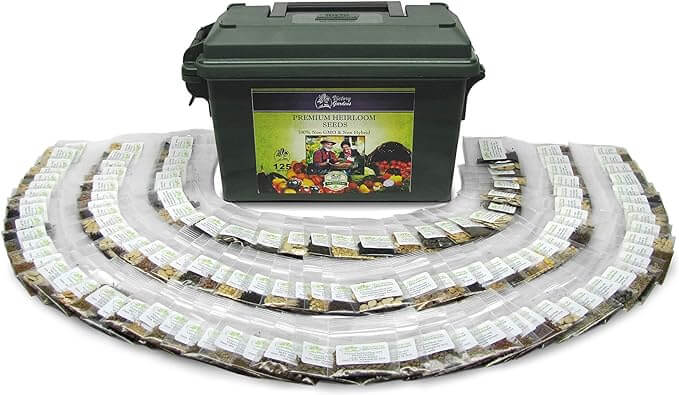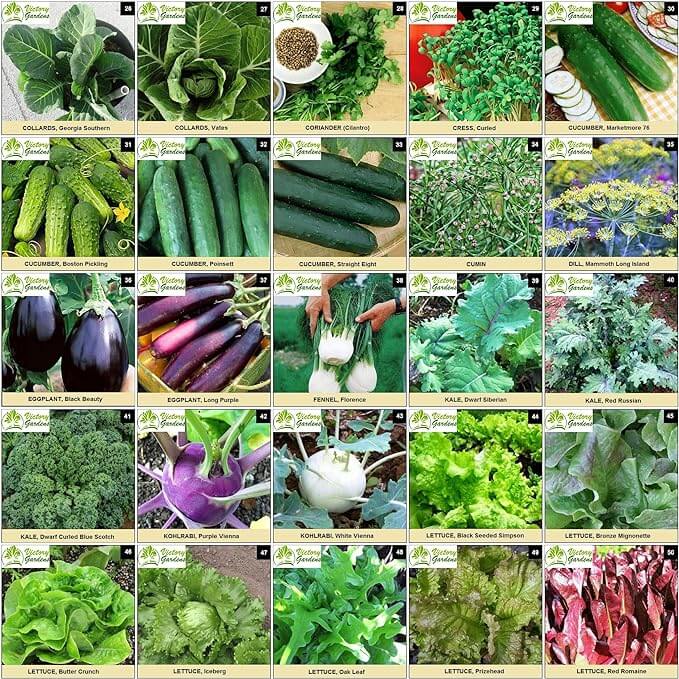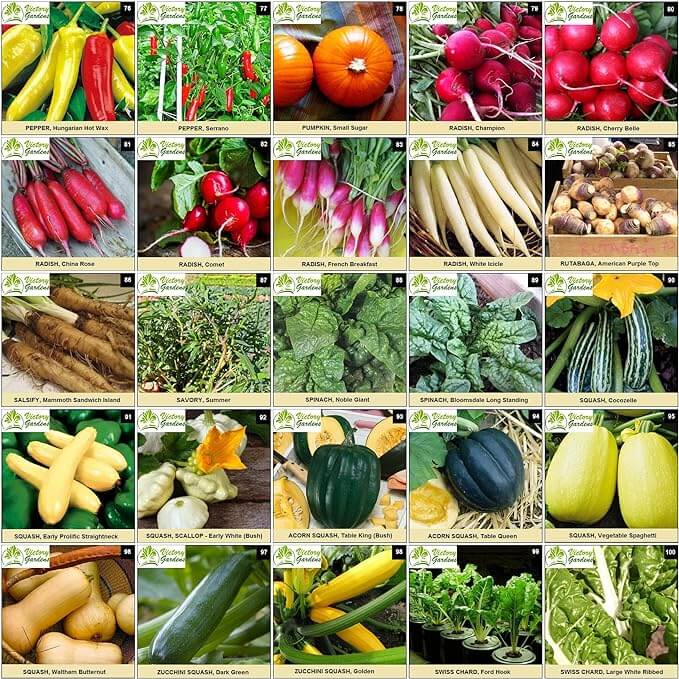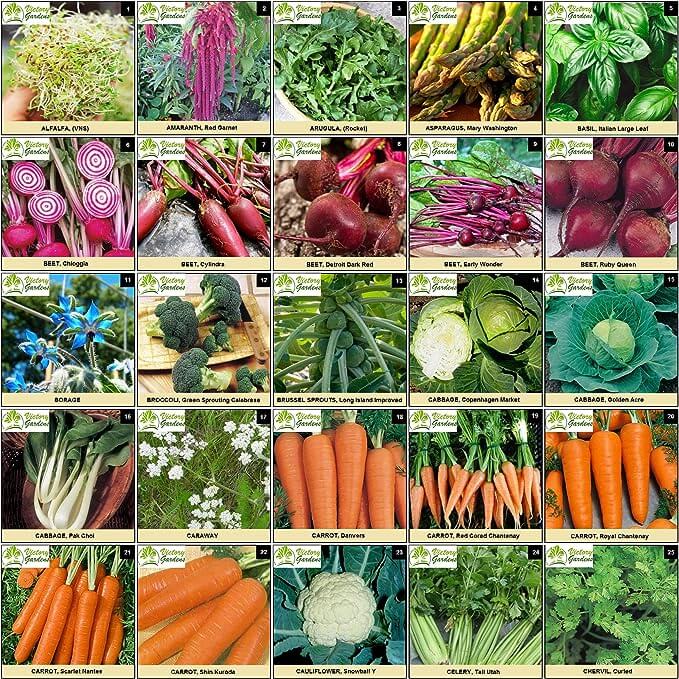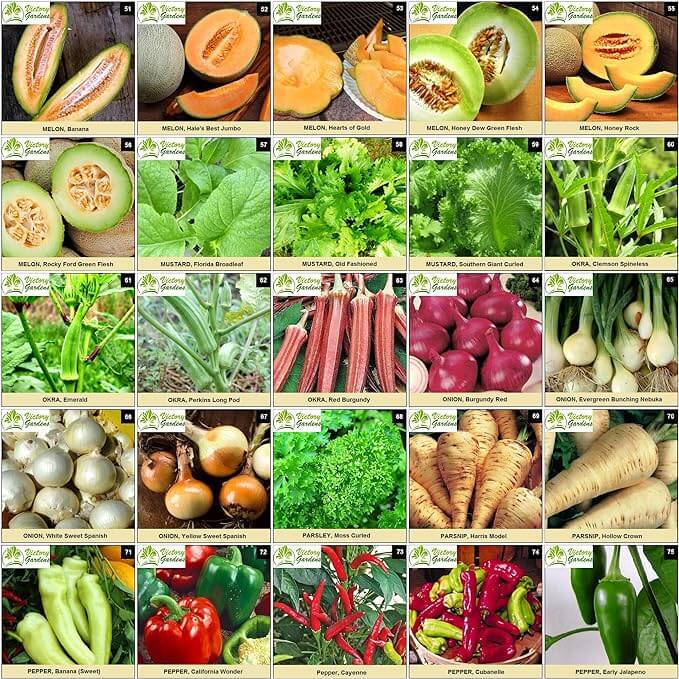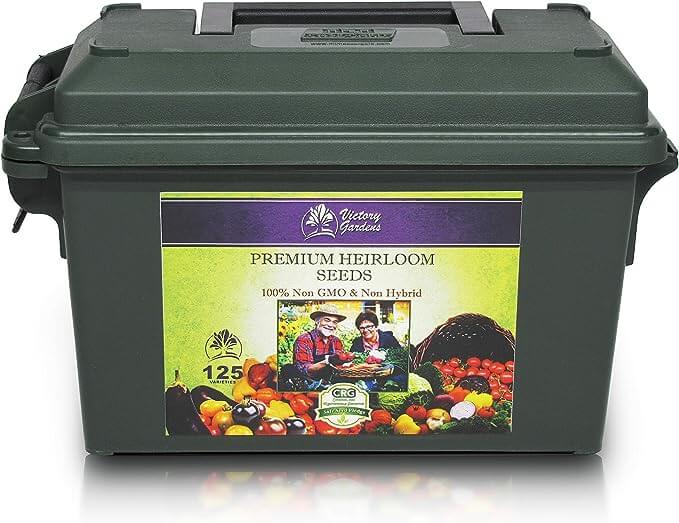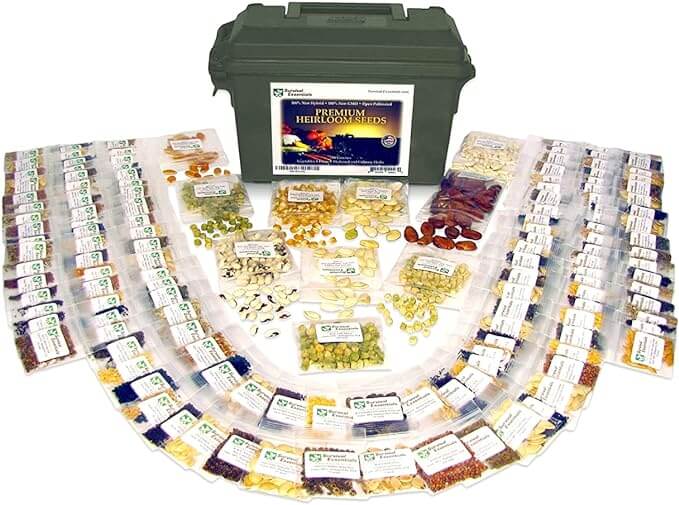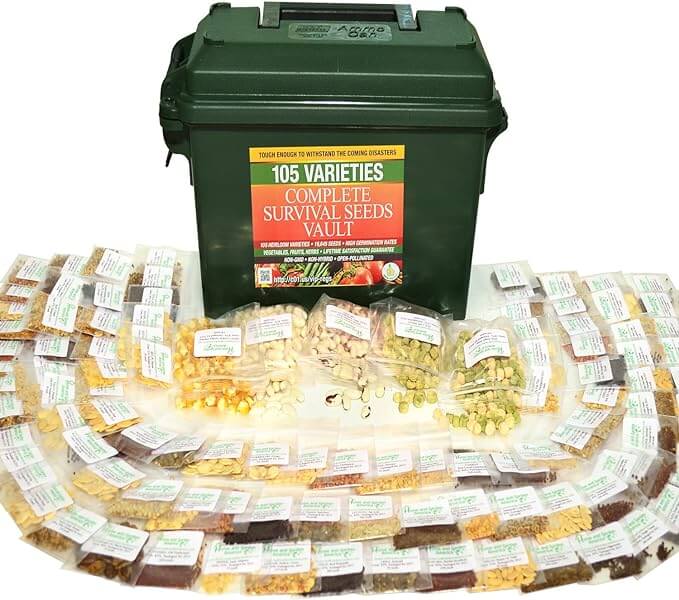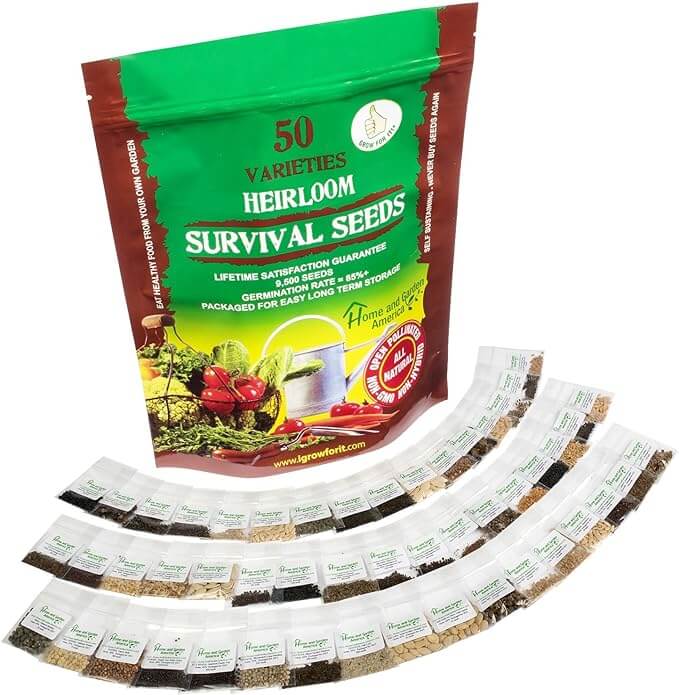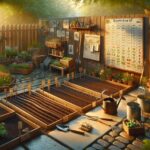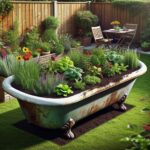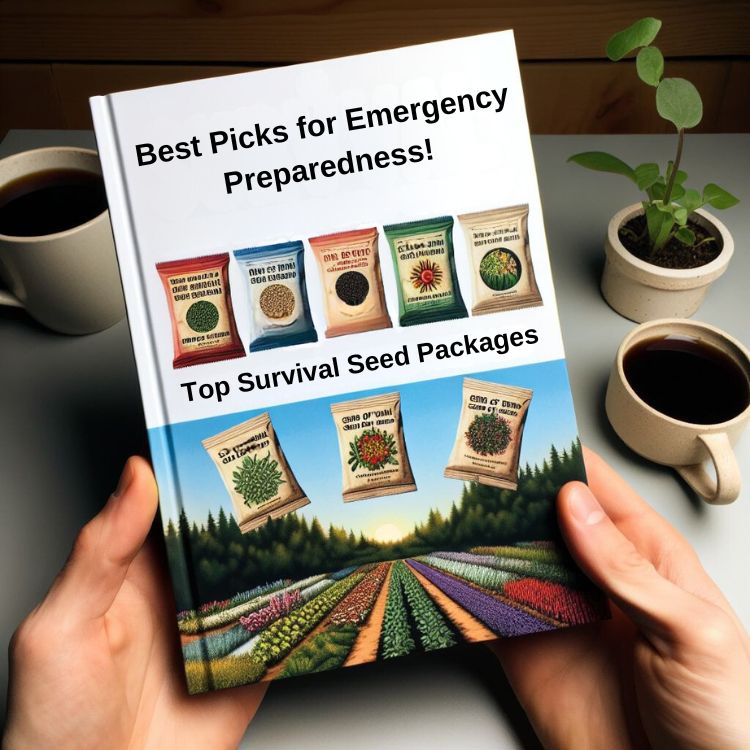
Gardening isn’t just a hobby; it’s a crucial step towards self-reliance, especially when times get tough. That’s where emergency survival seed kits come into play. They’re not just seeds; they’re your future food supply, a green insurance policy in your hands.
Why Every Home Needs an Emergency Survival Seed Kit
Imagine a scenario where grocery store shelves are empty, or a natural disaster has disrupted supply chains. An emergency survival seed kit is your lifeline. It’s a curated collection of seeds meant to start a garden that can sustain your family with fresh produce during times of crisis.
But it’s not just about survival. These kits encourage healthier eating and a deeper connection with the food you consume. Plus, they’re an educational tool for kids and adults alike, teaching valuable gardening skills that can last a lifetime.
Understanding the Importance of Seed Kits in Crisis
Why focus on seeds during an emergency? Because they’re the start of something greater. A single seed can yield dozens of fruits or vegetables, which in turn can produce thousands more seeds. It’s a cycle of abundance that begins with just a handful of tiny seeds.
Most importantly, these kits are designed to provide a variety of nutritious foods. They often include vegetables like carrots and kale for vitamins, beans and peas for protein, and herbs for both flavor and their medicinal properties.
Key Components of a Comprehensive Seed Kit
- Variety: A good kit should include a range of fruits, vegetables, and herbs to provide a balanced diet.
- Quantity: There should be enough seeds to grow a garden large enough to sustain your family.
- Quality: Look for non-GMO, heirloom varieties that can adapt to your local environment and can be harvested for seeds year after year.
- Shelf-life: Seeds should be packed for long-term storage, often in airtight containers that protect them from moisture and pests.
- Instructions: Clear guidance on how to plant, grow, and harvest the crops is crucial, especially for beginner gardeners.
Now, let’s talk about one of the best choices on the market.
Your Best Bet for Sustainability
When selecting a seed kit, you want to go with a trusted name. Victory Garden’s seed vault is packed with 125 varieties of heirloom, non-GMO seeds. This isn’t just a seed pack; it’s a blueprint for a comprehensive, sustainable food source.
“Experience the joy of growing your own food and the peace of mind that comes with it. Victory Gardens offers a seed vault that can turn any thumb green and any plot of soil into a lush garden.” – Victory Gardens Customer
The Victory Gardens’ seed vault emerges as a top choice for several compelling reasons. At its core, it provides the foundation for building a sustainable food source right in your backyard, but the benefits extend far beyond that.
Unmatched Variety: With 125 varieties of heirloom, non-GMO seeds, you’re not just setting up a garden; you’re curating a mini ecosystem. This extensive diversity ensures that you have a range of nutritional options at your disposal and helps promote a balanced and healthy garden by fostering a natural pest control system and nutrient exchange.
Quality and Longevity: These seeds are carefully selected for their quality and packaged in a resealable waterproof bag, ensuring their longevity. This is critical when planning for long-term sustainability and food security.
Adaptable to Various Growing Methods: Whether you have an expansive backyard, a small urban plot, or an indoor hydroponics system, these seeds are adaptable to a variety of growing conditions and methods. This flexibility makes it suitable for almost any gardener, irrespective of their available space or gardening experience.
Biodiversity Champion: By growing these heirloom varieties, you become part of the solution to preserving agricultural biodiversity. Many of these varieties are under threat due to industrial farming practices. Planting these in your garden helps preserve these precious resources for future generations.
Food Security and Independence: By offering such an extensive variety of seeds, Victory Gardens encourages you to grow diverse crops for different seasons. This can ensure a constant supply of fresh produce all year round, fostering independence from commercial food supply chains.
Educational and Fulfilling: There’s a unique satisfaction and joy derived from watching something grow from seed to fruit – it’s educational for kids and adults alike. This hands-on experience with nature can foster an appreciation for the environment and provide invaluable lessons on sustainability and self-reliance.
Given all these benefits, it’s no wonder why Victory Gardens’ seed vault is a top choice for those seeking to build a sustainable and secure food source. Investing in this seed vault is an investment in your health, your independence, and your contribution to preserving global biodiversity.
Why choose Victory Garden’s seeds? Because they understand the importance of biodiversity in your garden. Their selection includes a wide range of plants, each with its own role in your garden ecosystem. These seeds are perfect for both outdoor and indoor planting. Whether you’re a seasoned gardener or a beginner, you’ll find these seeds easy to plant and grow, and they are suitable for hydroponic systems too.
In the next part, we’ll dive deeper into what a Victory Garden is and why it’s vital for preparedness. You’ll also get to explore the top seed selection for ultimate preparedness and learn how to select the right seeds for your very own Victory Garden.
Top Seed Selection for Ultimate Preparedness
The seeds you choose to include in your Victory Garden can directly impact your garden’s productivity and the nutritional value of your produce. Look for varieties that are hardy, disease-resistant, and suitable for your local climate conditions. Some top picks include tomatoes, beans, peas, spinach, carrots, and various herbs like basil and rosemary.
Review of Seed Kits
Let’s take a closer look at some of the seed packages. You’ll find kits with just the basics, and others that are more comprehensive. The key is to find one that suits your specific needs.
| Seed Packages | Variety | Quantity | Quality | Shelf Life |
| Garden Seeds Vegetable Variety Pack by Victory Gardens | Includes 125 varieties of vegetables such as beans, beets, cabbage, carrot, corn, cucumbers, lettuce, peas, pumpkins, radishes, squash, and tomatoes. | Over 30,000 Non-GMO Heirloom Seeds | Seeds are all naturally grown and saved. They are also Non-GMO and open-pollinated | Comes in a superior ammo can for long-term storage and durability. The seeds are also sealed in an airtight Mylar bag within the ammo can. |
| Survival Essentials Ultimate Heirloom Seed Vault | Includes 135 varieties of vegetables, fruits, and herbs | Over 23,335 Non-Hybrid seeds | The seeds are all naturally grown and saved. They are also non-hybrid and non-GMO. | Comes in a superior ammo can for long-term storage and durability. The seeds are also sealed in an airtight Mylar bag within the ammo can. |
| Survival Garden Heirloom Seeds Non GMO by Grow For It | Contains 105 varieties of all natural vegetable seeds | Over 13,000 seeds | The seeds are Non-GMO and open-pollinated | Comes in a superior ammo can for long-term storage and durability. The seeds are also sealed in an airtight Mylar bag within the ammo can. |
| Heirloom Vegetable Seeds Non GMO Survival Seed Kit | Includes 50 different varieties of vegetables | Over 15,000 seeds | The seeds are all naturally grown and saved. They are also Non-GMO. | Comes in a waterproof resealable Mylar bag for long-term storage. |
Choosing the best seed kit for your garden is not just about quantity but quality, variety, and packaging as well. With these factors in mind, the “Garden Seeds Vegetable Variety Pack for Planting by Victory Gardens” lands the top spot on our list.
Why it’s the best: With an impressive collection of 125 heirloom varieties, this pack allows you to cultivate a diverse range of vegetables in your garden. These non-GMO seeds have been carefully selected to ensure that you get high-quality and healthy plants. Moreover, the resealable waterproof bag ensures easy storage and longevity of the seeds.
Why it’s a great choice: This kit boasts of 144 different seed varieties packed in a robust ammo can for superior durability and long-term storage. The wide range of seeds provided, totaling over 23,000, makes it a comprehensive option for both large-scale gardening and long-term survival planning.
Why it’s notable: Offering 105 varieties of herb, fruit, and vegetable seeds, this kit presents a delightful array for those interested in mixed cropping or succession planting. The non-GMO, open-pollinated seeds also promise sustained harvests over time, which adds to the sustainability aspect of gardening.
Why it’s noteworthy: This kit is known for its diverse selection of naturally grown vegetables that form part of our culinary heritage. The selection of seeds gives gardeners a unique opportunity to cultivate historically significant crops and contribute towards preserving biodiversity in home gardens.
Each of these kits brings something unique to the table – be it variety, quality, packaging or heritage. The ranking reflects the overall value each offers to a gardening enthusiast or someone looking to build a long-term survival garden. However, the best choice would ultimately depend on your specific gardening needs and preferences.
How to Select the Right Seeds
When it comes to selecting the right seeds for your garden, there are a few key factors that you need to keep in mind. Incorporating these considerations can help ensure a successful and rewarding gardening experience.
- Taste and Preference: First and foremost, it’s important to choose seeds for plants that you and your family enjoy eating. There’s no point in growing an abundance of beets if nobody in the household is fond of them. Tailoring your garden to your family’s dietary preferences will result in not only a flourishing garden but also eagerly anticipated harvests.
- Environmental Compatibility: Plants, like people, thrive under certain conditions and falter under others. Some plants do exceptionally well in cooler climates, while others need the sun’s warmth to flourish. Be mindful of your local climate and soil conditions when choosing your seeds. Matching your plant choices to your environment increases the chances of gardening success.
- Variety is Key: Diversity in your garden can serve multiple benefits. It can bring color and variety to your meals, making them more appealing and nutritious. But the advantages aren’t just aesthetic or culinary. A range of plant types can help deter pests and promote soil health. A varied garden is, by design, a resilient garden.
- Consider Growing Times: Paying attention to the maturation periods of different seeds can ensure a continuous harvest throughout the growing season. By selecting seeds that mature at different times, you ensure that you’ll always have something fresh and homegrown gracing your dinner table.
By taking these factors into account, you can curate a garden that’s not only beautiful but also bountiful and beneficial for both you and the environment. So as you sift through seed catalogues or browse online seed stores, keep these tips in mind. Your future self, sitting down to a meal of homegrown produce, will thank you.
Heirloom vs. Non-GMO: What’s Best for Your Kit
Heirloom seeds are the gems of the gardening world. They’ve been passed down through generations, often for more than 50 years, and are prized for their flavor and resilience. Non-GMO, on the other hand, simply means that the seeds haven’t been genetically modified. Most heirlooms are naturally non-GMO, but not all non-GMOs are heirlooms. For your emergency survival seed kit, heirlooms are the way to go. They offer stability in your garden and ensure that you can save seeds for future planting.
Crucial Vegetables to Grow for Nutritional Security
When it comes to nutritional security, you’ll want to focus on vegetables that are high in vitamins, minerals, and other nutrients. Leafy greens like spinach and kale are must-haves because they’re rich in iron and vitamins A, C, and K. Root vegetables like carrots and sweet potatoes are great too, as they’re high in fiber and vitamin A and can be stored for long periods.
Legumes like beans and peas are also crucial. They’re not only high in protein but also help fix nitrogen in the soil, which is beneficial for other plants in your garden. And let’s not forget about tomatoes and peppers, which are high in vitamin C and can be used in a variety of dishes.
Herbs and Medicinal Plants to Include in Your Seed Arsenal
Herbs are not just for flavor; many have medicinal properties that can be invaluable, especially when access to healthcare may be limited. Basil, for example, has anti-inflammatory properties, while mint can help with digestion. Here are a few herbs to consider:
- Basil: Anti-inflammatory and can help with digestion.
- Mint: Soothes stomachs and can help relieve headaches.
- Rosemary: High in antioxidants and can improve circulation.
- Lavender: Known for its calming effect and can help with sleep.
- Chamomile: Can aid in relaxation and help with sleep issues.
Planting a range of herbs not only boosts your garden’s health but also provides you with natural remedies right at your doorstep.
Getting Your Garden Growing: Steps to Success
Starting a garden can feel overwhelming, but it doesn’t have to be. Begin by finding a spot with good sunlight — most vegetables need at least 6 hours of direct sun per day. Next, test your soil to see what nutrients it might be lacking, and amend it as needed. Then, plan your garden layout with taller plants in the back so they don’t shade the smaller ones.
When it’s time to plant, follow the instructions on your seed packets carefully. Planting depth and spacing are important for healthy growth. And remember to water consistently. Seedlings are especially vulnerable to drying out, so keep the soil moist (but not waterlogged).
Long-Term Seed Storage: Keeping Your Seeds Viable
Proper storage is critical for maintaining the viability of your seeds. Keep them in a cool, dry place, away from direct sunlight. Some people use their refrigerator or freezer, which can extend the life of seeds significantly. The key is to prevent moisture from getting in, so use airtight containers and consider adding silica gel packets to absorb any excess moisture.
Label your seeds with the date and type of seed. This will help you keep track of their age and ensure you use older seeds first. Properly stored, some seeds can remain viable for five years or more, though germination rates will decrease over time.
Ideal Conditions for Your Survival Garden
For your survival garden to thrive, it needs the right conditions. Besides good soil and plenty of sunlight, protection from the elements and pests is important. If you live in an area with lots of wildlife, consider fencing to keep critters out. Raised beds can also help with drainage and reduce back strain when planting and harvesting.
Companion planting is another strategy to improve your garden’s health. This is when you plant certain plants together because they help each other grow. For example, marigolds can deter pests, while beans can add nitrogen to the soil, which is beneficial for plants like corn and squash.
By following these steps and choosing the right seeds, like those from Victory Garden, you’ll be well on your way to creating a sustainable and nutritious food source for your family. Remember, a garden is more than just a source of food — it’s a source of life.
As you embark on your journey to self-sufficiency, it’s essential to understand the longevity and sustainability of your resources. Seeds, in particular, are the foundation of your garden and future food security. So, let’s address some crucial questions you might have as you plan your survival garden.
FAQ
How Long Can I Store Survival Seeds Before They Lose Potency?
Seed viability is the cornerstone of planning for long-term food production. Generally, seeds can be stored for several years if kept in the right conditions. Most seeds will remain viable for at least 2-3 years, but some, like parsnip or spinach, may need to be used within a year for best results. On the other hand, seeds like beans, peas, and tomatoes can last up to 4 years or more. The key to extending their shelf life is proper storage — keep them cool, dark, and dry. Vacuum sealing and freezing can extend their life even further, up to a decade in some cases.
Can I Use Seeds from My Own Produce to Create a Survival Seed Kit?
Using seeds from your own produce can be a rewarding and sustainable practice. It allows you to select the best-performing plants to save seeds from, ensuring that your garden is tailored to your specific environment over time. However, it’s important to save seeds from heirloom or open-pollinated plants, as seeds from hybrid plants may not produce true to the parent plant. If you plan on saving seeds, learn the proper techniques for harvesting, drying, and storing them to maintain their viability.
- Choose heirloom or open-pollinated plants for seed saving.
- Harvest seeds from the healthiest and most productive plants.
- Dry seeds thoroughly before storage to prevent mold.
- Store seeds in a cool, dry, and dark place to maintain viability.
Saving your own seeds not only provides a sense of accomplishment but also helps develop a garden that’s uniquely adapted to your local conditions.
Now, let’s delve into the types of seeds that can make your garden both diverse and resilient.
What’s the Difference Between Heirloom and Hybrid Seeds?
When planning your survival garden, the choice between heirloom and hybrid seeds is pivotal. Heirloom seeds are traditional varieties that have been passed down through generations. They are open-pollinated, meaning they reproduce true to type, making them ideal for seed saving. Hybrid seeds, on the other hand, are the result of cross-pollinating two different plant varieties. They often offer improved disease resistance and vigor but don’t reproduce true to type, making them less suitable for seed saving.
- Heirloom Seeds: Open-pollinated and genetically stable; can be saved and replanted year after year.
- Hybrid Seeds: Result from cross-pollination; offer specific advantages but not suitable for seed saving.
Choosing heirloom seeds for your survival kit means investing in a sustainable future, as you can save and replant your seeds each season.
How Do I Protect My Survival Garden in Harsh Weather Conditions?
Protecting your survival garden from harsh weather is about planning and prevention. Start by selecting plants that are suitable for your climate zone. Use mulch to regulate soil temperature and moisture, and consider installing a rainwater collection system to water your plants during dry spells. For extreme conditions like frost or heatwaves, protective coverings like row covers or shade cloth can shield your plants. Always be ready to adapt your garden practices to the current weather conditions to ensure the survival of your crops.
Can I Grow a Survival Garden in an Urban Setting?
Urban gardening is not only possible but also increasingly popular. Balconies, rooftops, and even window sills can become productive spaces. Container gardening is a versatile option for growing vegetables and herbs, and vertical gardening can maximize limited space. Community gardens are another great way to grow food if you lack space at home. The key is to utilize every bit of space efficiently and choose plants that are suited to container life, like lettuce, herbs, and dwarf tomato varieties.
Even in an urban environment, with the right approach and a bit of creativity, you can cultivate a thriving garden that contributes to your food security.

